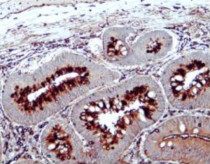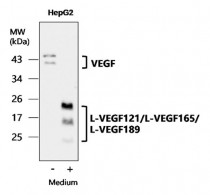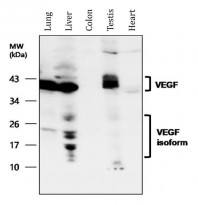ARG41913
anti-VEGF antibody
anti-VEGF antibody for IHC-Formalin-fixed paraffin-embedded sections,Western blot and Human,Mouse
Overview
| Product Description | Rabbit Polyclonal antibody recognizes VEGF |
|---|---|
| Tested Reactivity | Hu, Ms |
| Predict Reactivity | Rat |
| Tested Application | IHC-P, WB |
| Specificity | Detects the 121, 165 and 189 VEGF isoforms. |
| Host | Rabbit |
| Clonality | Polyclonal |
| Isotype | IgG |
| Target Name | VEGF |
| Conjugation | Un-conjugated |
| Alternate Names | MVCD1; Vascular permeability factor; VEGF-A; VPF; VEGF; Vascular endothelial growth factor A |
Application Instructions
| Application Suggestion |
|
||||||
|---|---|---|---|---|---|---|---|
| Application Note | * The dilutions indicate recommended starting dilutions and the optimal dilutions or concentrations should be determined by the scientist. | ||||||
| Observed Size | ~ 16 - 45 kDa |
Properties
| Form | Liquid |
|---|---|
| Purification | Affinity purified. |
| Buffer | 100 mM Tris Glycine (pH 7.0), 0.025% ProClin 300 and 20% Glycerol. |
| Preservative | 0.025% ProClin 300 |
| Stabilizer | 20% Glycerol |
| Concentration | 1.56 mg/ml |
| Storage Instruction | For continuous use, store undiluted antibody at 2-8°C for up to a week. For long-term storage, aliquot and store at -20°C. Storage in frost free freezers is not recommended. Avoid repeated freeze/thaw cycles. Suggest spin the vial prior to opening. The antibody solution should be gently mixed before use. |
| Note | For laboratory research only, not for drug, diagnostic or other use. |
Bioinformation
| Database Links |
Swiss-port # P15692 Human Vascular endothelial growth factor A Swiss-port # Q00731 Mouse Vascular endothelial growth factor A |
|---|---|
| Gene Symbol | VEGFA |
| Gene Full Name | vascular endothelial growth factor A |
| Background | This gene is a member of the PDGF/VEGF growth factor family and encodes a protein that is often found as a disulfide linked homodimer. This protein is a glycosylated mitogen that specifically acts on endothelial cells and has various effects, including mediating increased vascular permeability, inducing angiogenesis, vasculogenesis and endothelial cell growth, promoting cell migration, and inhibiting apoptosis. Elevated levels of this protein is linked to POEMS syndrome, also known as Crow-Fukase syndrome. Mutations in this gene have been associated with proliferative and nonproliferative diabetic retinopathy. Alternatively spliced transcript variants, encoding either freely secreted or cell-associated isoforms, have been characterized. There is also evidence for the use of non-AUG (CUG) translation initiation sites upstream of, and in-frame with the first AUG, leading to additional isoforms. [provided by RefSeq, Jul 2008] |
| Function | Growth factor active in angiogenesis, vasculogenesis and endothelial cell growth. Induces endothelial cell proliferation, promotes cell migration, inhibits apoptosis and induces permeabilization of blood vessels. Binds to the FLT1/VEGFR1 and KDR/VEGFR2 receptors, heparan sulfate and heparin. NRP1/Neuropilin-1 binds isoforms VEGF-165 and VEGF-145. Isoform VEGF165B binds to KDR but does not activate downstream signaling pathways, does not activate angiogenesis and inhibits tumor growth. [UniProt] |
| Cellular Localization | Secreted. Note=VEGF121 is acidic and freely secreted. VEGF165 is more basic, has heparin-binding properties and, although a signicant proportion remains cell-associated, most is freely secreted. VEGF189 is very basic, it is cell-associated after secretion and is bound avidly by heparin and the extracellular matrix, although it may be released as a soluble form by heparin, heparinase or plasmin. [UniProt] |
| Highlight | Related products: VEGF antibodies; VEGF ELISA Kits; VEGF Duos / Panels; VEGF recombinant proteins; Anti-Rabbit IgG secondary antibodies; Related news: The role of HDGF in tumor angiogenesis |
| Calculated MW | 16 - 45 kDa |
Images (3) Click the Picture to Zoom In
-
ARG41913 anti-VEGF antibody IHC-P image
Immunohistochemistry: Paraffin-embedded Human colorectal carcinoma tissue stained with ARG41913 anti-VEGF antibody.
-
ARG41913 anti-VEGF antibody WB image
Western blot: 30 µg of HepG2 cell lysate stained with ARG41913 anti-VEGF antibody at 1:1000 dilution, overnight at 4°C.
-
ARG41913 anti-VEGF antibody WB image
Western blot: 60 µg of Human lung, liver, colon, testis and heart lysates stained with ARG41913 anti-VEGF antibody at 1:500 dilution, overnight at 4°C.








